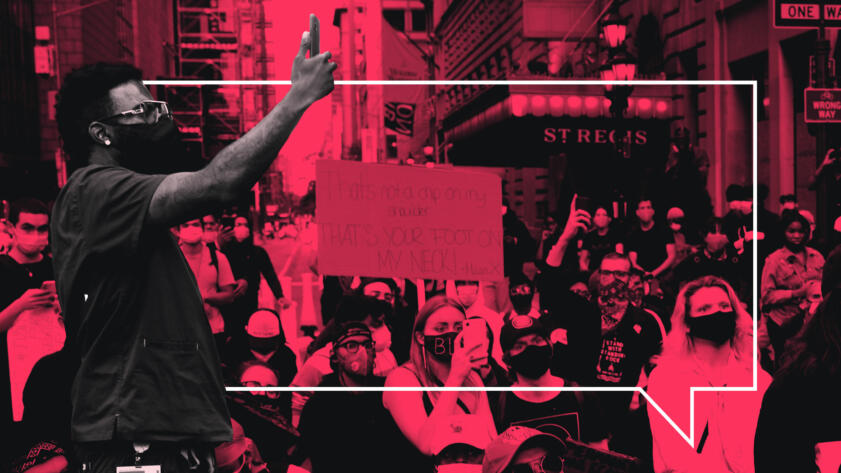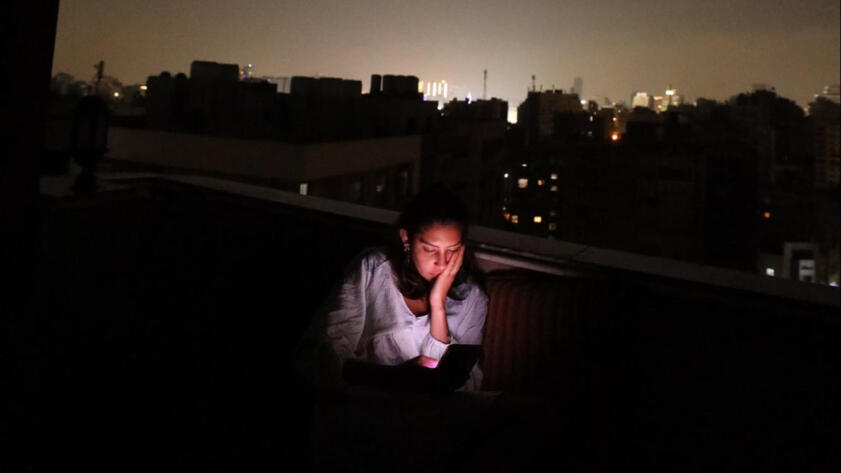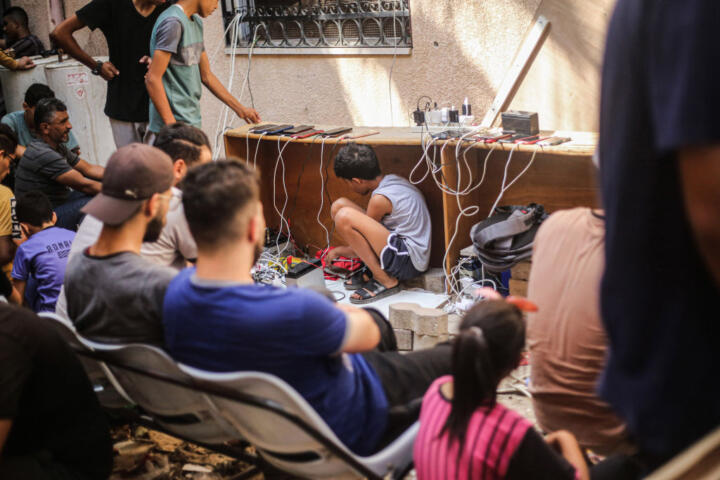Since the Israel–Hamas war began in early October, Farid Sami Alzaro, 27, has had little control over how and when he can communicate with his family. Alzaro lives in Cairo, and his extended family lives in Gaza.
The ability to make phone calls or connect to the Internet has been severely interrupted in Gaza since the war began, and continues to get worse, according to data from NetBlocks, an organization that monitors internet access. Palestinian telecom providers said that Israel’s attacks have damaged communication lines and towers, according to Al Jazeera and Wired.
Israel has also cut off phone and internet access in Gaza several times in the last two weeks, according to multiple news outlets.
Alzaro didn’t hear from his family for three days during the first blackout, which took place from Oct. 27 to 29. He did not know whether they were alive, had food or water, were able to sleep, or whether his family home had been bombed, he told The Markup. Then he received a short phone call from one of his relatives who had found a functioning phone at a neighbor’s house, letting him know that they were fine and asking him to pray for them.
Then, on Nov. 1, another day of radio silence. Alzaro didn’t know when he’d hear from his family next.
“I lost all hope again,” he said.

The Breakdown
How Do I Prepare My Phone for a Protest? (2020)
Simple steps to take before hitting the streets
Alzaro had read on Instagram that people from around the world were donating and delivering eSIM cards to Palestinians. Despite the name, eSIM cards aren’t physical cards at all but pieces of software that act like traditional SIM cards, allowing people to activate a new cellular plan with phone and internet access on their existing phone. Alzaro wrote to Egyptian writer and journalist Mirna El Helbawi, who was organizing an eSIM distribution campaign, and she promptly sent him access information for an eSIM to share with his family in Gaza. His family couldn’t get it to work. When he told El Helbawi, she sent him access information for a second one.
A full day after he shared the second eSIM’s info, Alzaro’s family called. It worked.
“It was the happiest moment of my life,” Alzaro said in an Instagram message. “I talked. Also with my grandmother, who is Alzheimer’s patient, do you know what she said to me? I want to hug you until you sleep in my arms, I don’t want anything but to see you.”
El Helbawi said she has distributed more than 7,000 eSIM cards free of charge since she started her campaign on Oct. 28. Within a few hours of launch, her campaign went viral. El Helbawi said that people across Europe, Canada, the US, Australia, Mexico, and other countries sent her eSIMs. She now has more than 14,000, donated by individuals who wanted to help bring connectivity to Palestinians in Gaza. Simly, a company that specializes in eSIMs, also reached out and provided thousands more. The feminist organization Speak Up put together a bilingual guide on how to activate eSIMs.
Because donors purchase eSIMs using the telecom providers in their country and load it up with data, they’re also notified by their provider when the eSIM is activated. When Palestinians in Gaza use these eSIMs to connect to the internet, they’re essentially doing so through the donor’s telecom service. Many people who have donated to El Helbawi’s campaign have posted activation screenshots on social media.
The unknown and the uncertainty is a monster. It can eat you alive.
Mirna El Helbawi
El Helbawi has barely slept since she began her campaign, trying desperately to distribute eSIM cards while bearing witness to one harrowing account after another of what life is like in the middle of a war zone.
On Saturday evening, she was trying to help get a young man’s eSIM to work when he told her he needed to step away for a little bit. A bomb may have hit his cousin’s house on a neighboring street, he said, and he had to go check whether his cousin was still alive. “I’ll come back,” he told her.
Another time, she helped a father, who lived outside of Gaza, try to get his wife and children, who were in Gaza, access to a working phone. They had only been able to contact each other every two to three days, and the line kept breaking up, he told her. El Helbawi recounted that he’d needed to talk to them because if it was their last call together, he needed to hear them say goodbye.
On X, El Helbawi posted what one person who asked for an eSIM wrote, “The only thing I want in my life now is an e-sim to be able to call my family in Gaza, even if it will be the last call, let me tell them goodbye before they get killed.”
“My heart got shattered in pieces,” she said. “He doesn’t want the internet connection to go on YouTube, not to be active on social media. He just wants to be there for the goodbye call. He’s expecting his wife and kids to be killed any minute.”
El Helbawi described that every time she chooses to sleep, she feels guilty. “There are people who are waiting on my social media who are willing and wanting to reconnect with their family. [It] is killing me every minute.”
That’s why a newly formed team is helping her: Gehad Hamdy, founder of Speak Up, was the first to join. Then, El Helbawi brought in two friends of hers, Marwan Abdelmawla and Mohamed Bebars, and Doaa Gawish, who asked if El Helbawi needed help and then recruited another 8 to 10 people. Together, they created shifts so someone would be available to distribute eSIMs 24 hours a day.
Taking ‘baby steps together across the world’
When Hamas fighters stormed into Israel on Oct. 7 and Israel declared war the next day, El Helbawi had been glued to her phone “24/7, checking the news.” She felt helpless watching the news of Israeli bombs and troops killing Palestinians in Gaza. She tried to share information about the attacks on her social media accounts—El Helbawi has 763,000 followers on Instagram and 165,000 followers on X (formerly Twitter). But she didn’t feel like she was doing enough.
While looking for a way to help, she heard that eSIM cards might work to restore people’s phone and internet connections in Gaza. So she started a grassroots campaign to collect eSIMs and to distribute them to Palestinians.
“[People] have to be able to be connected to hospitals and doctors; they have to be able to be connected to their loved ones, their family,” El Helbawi said. “The unknown and the uncertainty is a monster. It can eat you alive. It can leave you in so many infinite possibilities of what could have happened to your family, what could have happened to your friend. It’s not fair to cut off the basic and the bare minimum of rights for people in Gaza.”
eSIMs are a relatively new technology originally built for devices like drones, wearable gadgets, and location trackers, according to PC Magazine. They are now a popular choice for travelers, since adding an eSIM with phone and data coverage in the countries you’re visiting can be much more cost-effective than paying for international roaming charges on your regular plan. Many phones support eSIMs, though a small number of phones do not.
El Helbawi said that most people donating and receiving eSIMs are learning about them for the first time. “[They’re] new to all people—to the donors, to the people who live in Gaza, who I’m providing eSIMs, and to me as well. So it was like we are all taking our baby steps together across the world.”
Soon, the team noticed that not all eSIMs work throughout Gaza. Through trial and error, they figured out which eSIMs, from which country, worked in which parts of Gaza. Each team member works with a person until they are connected. Many people who have gotten connected have then helped other Palestinians on the ground.
It’s hard to predict whether eSIMs will continue to work in Gaza, and specifically, whether they will work during future blackouts, since the technical details of Israel’s efforts to deny internet and phone access aren’t well documented.
El Helbawi has temporarily stopped accepting eSIMs until those already donated have been given to people in need. And while she’s happy about the campaign, she hopes that this effort does not need to grow any further. Instead, she hopes for a ceasefire and for connectivity to be reestablished soon.
“I know there are bigger issues … in Gaza,” she said. “But connecting them is the only way in my hands now to help them on the ground.”






